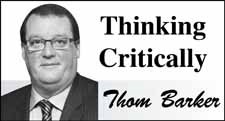There is a great quote preceding Chapter One of Eli Pariser's book The Filter Bubble, which I wrote about last week (Thinking Critically, Yorkton This Week, July 23, 2014).
"If you're not paying for something, you're not the customer; you're the product being sold."
Pariser attributes this quote to someone named Andrew Lewis, who as far as I was able to ascertain is not particularly noteworthy except for having come up with this very poignant comment.
It is pertinent to a story someone told me last week about Google giving the people of San Francisco free citywide WiFi as an apology for raising property values in the city as a result of the Internet giant's mere presence.
I thought it was an interesting story, but my skeptical antennae were immediately raised. As it turns out, there was a tentative deal between Earthlink, Google and the City of San Francisco dating to the mid-2000s that might have got the job done had Earthlink not bailed on its municipal WiFi business and the project had not become mired in political "bickering" between the mayor and Board of Supervisors (city council in most places).
How these stories profligate without verification is another fascinating outcome of the Internet, which of course is why, faithful readers, you have me.
What led to the controversy that ultimately derailed the project was public concern over the possible business models of a private-public partnership, which were either advertising- or subscription-based. Hence, my reference to the above Andrew Lewis quote. Nothing is free.
San Francisco did want to provide its citizens with free WiFi, though, and Google did make a "no strings attached" gift of nearly $600,000 that allowed the City to turn on "free" and advertising-free WiFi in 31 city parks in July 2013. Part of the donation was maintenance services for two years, after which the City will take over.
The City also implemented three miles of free WiFi along its busiest commuter route from the Castro District to the Embarcadero in December 2013, this time going it all alone. Well done.
I think this brings up an important point of discussion for Canada. In the radio and television age-yes, they are still important technologies, but their golden ages are over-our government had the foresight to put a high value on public broadcasting.
That commitment has been degenerating for some time now, partially because of the antagonistic attitude of the current government toward the CBC, but also partially because of the proliferation of new technology.
I have written in the past about the importance of maintaining the public broadcaster and I stand by that, but in the Internet age, maybe it is time to start taking back the Internet from the big corporations and remodelling how services are and what content is provided in the public interest.
This is the age in which we live. Technology changes and expectations change. Increasingly people want Internet services. As San Francisco has shown in this case, there can be a role for government in doing it. It is free, but, of course, it is not. The citizens are ultimately paying for it through their taxes, as we pay for public broadcasting. There are lots of benefits, but primary among them is not being beholden to commercial interests.
Seems like a good model to me.




